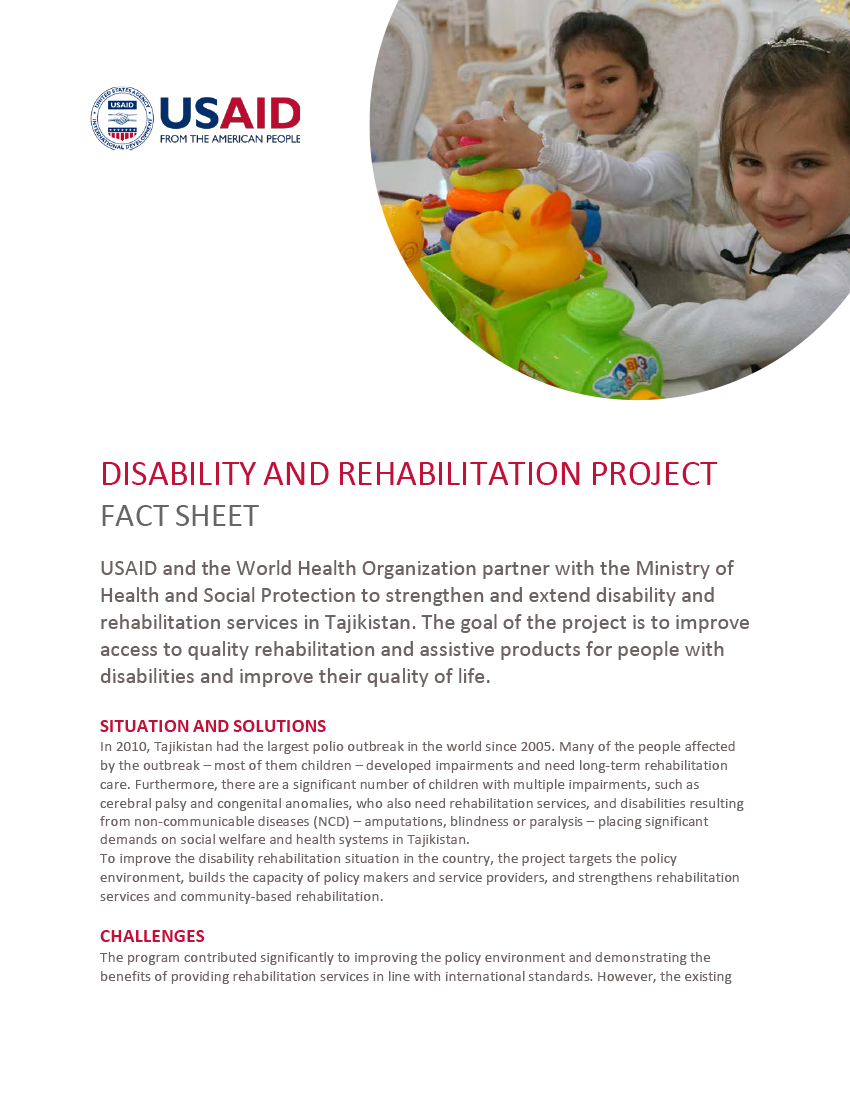Speeches Shim
Disability and Rehabilitation Project Fact Sheet ![]() (pdf - 210k)
(pdf - 210k)
SITUATION AND SOLUTIONS
In 2010, Tajikistan had the largest polio outbreak in the world since 2005. Many of the people affected by the outbreak – most of them children – developed impairments and need long-term rehabilitation care. Furthermore, there are a significant number of children with multiple impairments, such as cerebral palsy and congenital anomalies, who also need rehabilitation services, and disabilities resulting from non-communicable diseases (NCD) – amputations, blindness or paralysis – placing significant demands on social welfare and health systems in Tajikistan.
To improve the disability rehabilitation situation in the country, the project targets the policy environment, builds the capacity of policy makers and service providers, and strengthens rehabilitation services and community-based rehabilitation.
CHALLENGES
The program contributed significantly to improving the policy environment and demonstrating the benefits of providing rehabilitation services in line with international standards. However, the existing services in Tajikistan remain inadequate to meet the needs of the population. There is a strong need to have trained rehabilitation professionals in hospitals in order to prevent disabilities as well as a need to strengthen the assistive devices sector in the country.
EXPECTED RESULTS
- Adoption of National Program on rehabilitation of persons with disabilities in Tajikistan (2017-2020) by Government , Republic of Tajikistan - more than 170,000 registered people with long-term impairments (physical, sensorial and intellectual), 59% of people with NCD as well as people with difficulties in functioning due to infectious disease, injuries or frailty in old age are benefiting from the National Program in Tajikistan.
- Strengthening of leadership and management capacity of the Government of Tajikistan to effectively implement the multi-sectoral National Program on Rehabilitation.
- Advocated for including the rights of persons with disabilities in the Tajikistan Mid-Term Development Strategy (2016-2020) and the National Development Strategy (2016-2030).
- Supported the Government of Tajikistan in joining the Convention on the Rights of Persons with Disabilities.
- Strengthened rehabilitation interventions for children with disabilities, including 90% of the confirmed polio victims in 2010.
- Provided technical support to the Ministry of Health in scaling up community-based rehabilitation (CBR) programs in 35 districts of Tajikistan to ensure availability of rehabilitation services in rural and remote areas. The project also positively influenced the Government’s funding for CBR, which increased from $672,000 in 2017 to $830,000 in 2018. Over the last two years, 6,290 people with disabilities have benefited from CBR services through public-private partnership.
- Built the capacity of the Ministry of Health’s rehabilitation centers for physiotherapy and occupational therapy.
- Supported specialized training for two doctors in physical medicine and rehabilitation, both of whom now work in rehabilitation centers and provide quality rehabilitation services to children and adults with disabilities.
- Supporting two students currently pursuing Bachelor’s in Physiotherapy and Bachelor’s in Occupational Therapy, as well as four students studying for their International Certificate on Rehabilitation Therapy Assistance. All students will return by February 2019 and work in Ministry of Health rehabilitation centers.
- Strengthened the assistive devices sector (wheelchairs, crutches, etc.) by providing technical support in developing Tajikistan priority list of assistive products that is in sync with the country’s needs.
- Facilitated support to build a rehabilitation unit within the National Medical Center.
- Supported Tajikistan in securing 4.5 tons of Braille paper to support education for more than 1,000 blind children and young adults.
- Based on Tajikistan project learnings and successes, a new regional program to scale-up rehabilitation and assistive technology in the WHO European Region has been initiated.
PROJECT DURATION
2018 – 2022
IMPLEMENTING ORGANIZATION
World Health Organization (WHO)
PROJECT AREA
Tajikistan, National level
CONTACT
Malika Makhkambaeva
Agreement Officer’s Representative (AOR)
USAID/Tajikistan
E-mail: mmakhkambaeva@usaid.gov


Comment
Make a general inquiry or suggest an improvement.